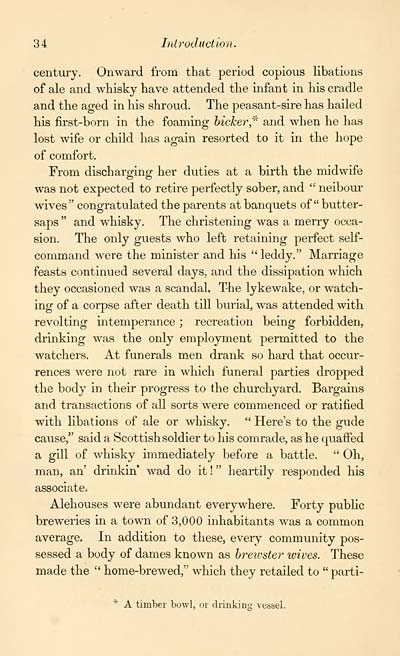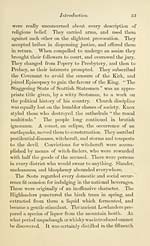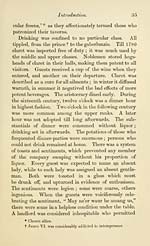Grampian Club > Scotland, social and domestic
(40) Page 34
Download files
Complete book:
Individual page:
Thumbnail gallery: Grid view | List view

34 Introduction.
century. Onward from that period copious libations
of ale and whisky have attended the infant in his cradle
and the aged in his shroud. The peasant-sire has hailed
his first-born in the foaming bicker,"" and when he has
lost wife or child has again resorted to it in the hope
of comfort.
From discharging her duties at a birth the midwife
was not expected to retire perfectly sober, and " neibour
wives" congratulated the parents at banquets of" butter-
saps " and whisky. The christening was a merry occa-
sion. The only guests who left retaining perfect self-
command were the minister and his "leddy." Marriage
feasts continued several days, and the dissipation which
they occasioned was a scandal, The lykewake, or watch-
ing of a corpse after death till burial, was attended with
revolting intemperance ; recreation being forbidden,
drinking was the only employment permitted to the
watchers. At funerals men drank so hard that occur-
rences were not rare in which funeral parties dropped
the body in their progress to the churchyard. Bargains
and transactions of all sorts were commenced or ratified
with libations of ale or whisky. " Here's to the gude
cause," said a Scottish soldier to his comrade, as he quaffed
a gill of whisky immediately before a battle. " Oh,
man, an' drinkin' wad do it ! " heartily responded his
associate.
Alehouses were abundant everywhere. Forty public
breweries in a town of 3,000 inhabitants was a common
average. In addition to these, every community pos-
sessed a body of dames known as brewster wives. These
made the " home-brewed," which they retailed to " parti-
* A timber bowl, or drinking vessel.
century. Onward from that period copious libations
of ale and whisky have attended the infant in his cradle
and the aged in his shroud. The peasant-sire has hailed
his first-born in the foaming bicker,"" and when he has
lost wife or child has again resorted to it in the hope
of comfort.
From discharging her duties at a birth the midwife
was not expected to retire perfectly sober, and " neibour
wives" congratulated the parents at banquets of" butter-
saps " and whisky. The christening was a merry occa-
sion. The only guests who left retaining perfect self-
command were the minister and his "leddy." Marriage
feasts continued several days, and the dissipation which
they occasioned was a scandal, The lykewake, or watch-
ing of a corpse after death till burial, was attended with
revolting intemperance ; recreation being forbidden,
drinking was the only employment permitted to the
watchers. At funerals men drank so hard that occur-
rences were not rare in which funeral parties dropped
the body in their progress to the churchyard. Bargains
and transactions of all sorts were commenced or ratified
with libations of ale or whisky. " Here's to the gude
cause," said a Scottish soldier to his comrade, as he quaffed
a gill of whisky immediately before a battle. " Oh,
man, an' drinkin' wad do it ! " heartily responded his
associate.
Alehouses were abundant everywhere. Forty public
breweries in a town of 3,000 inhabitants was a common
average. In addition to these, every community pos-
sessed a body of dames known as brewster wives. These
made the " home-brewed," which they retailed to " parti-
* A timber bowl, or drinking vessel.
Set display mode to: Large image | Transcription
Images and transcriptions on this page, including medium image downloads, may be used under the Creative Commons Attribution 4.0 International Licence unless otherwise stated. ![]()
| Publications by Scottish clubs > Grampian Club > Scotland, social and domestic > (40) Page 34 |
|---|
| Permanent URL | https://digital.nls.uk/81897164 |
|---|
| Description | Note: Numbers 24-41 are relative to but not part of the Club's series. |
|---|---|

